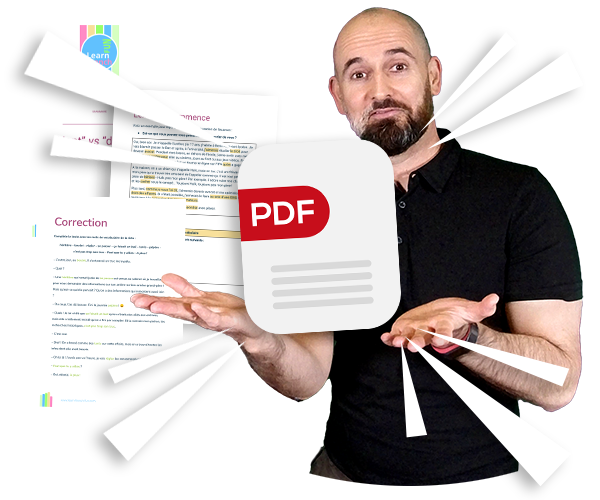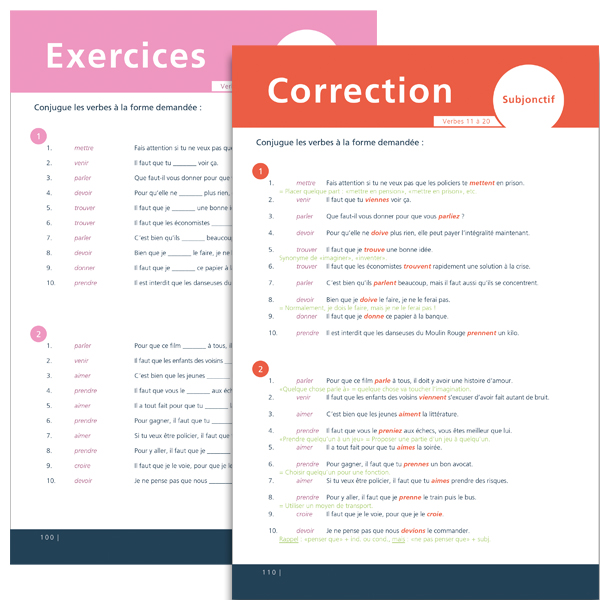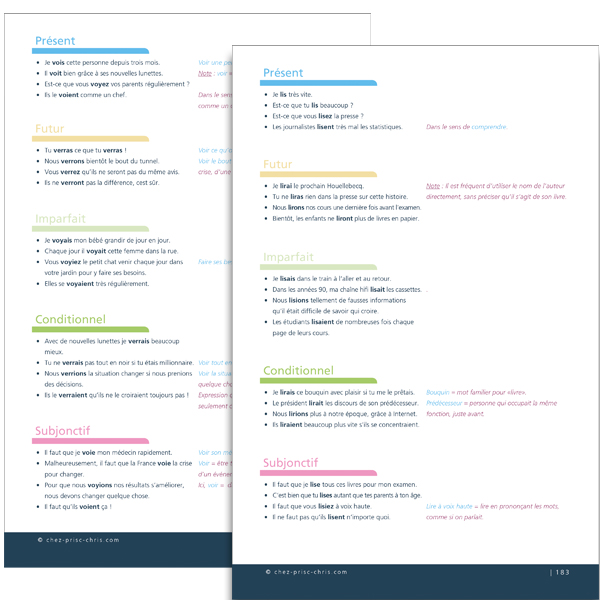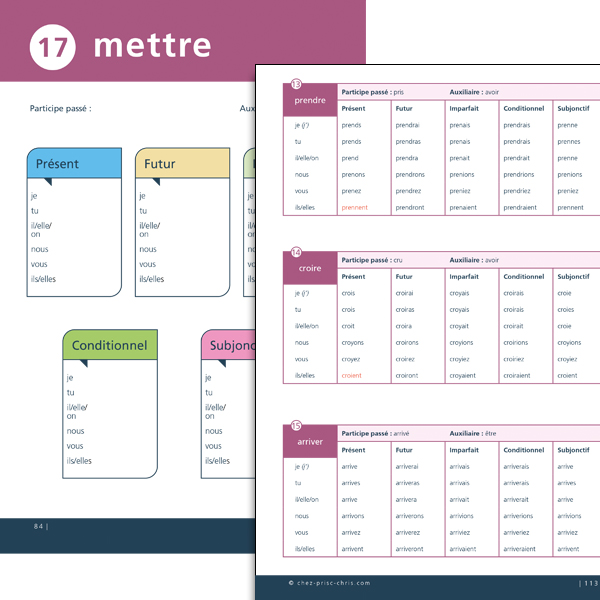Why are you learning French?

PDF Bonus
We have prepared a free PDF to help you with 3 tips to speak French easier.
👉 Download it for free
At the end, you will have exercises to practice with the correction. 👍
The first reason is maybe that you have no choice… You have to! Some kind of “monster” has decided that you have to learn French.
Don’t worry, I know this monster… It’s called : l’école (school) 😂
A second reason is that you like to travel in France or in French speaking countries.
You like the French way of life:

But, whether you started learning French because you had to or because you like coming to France, in any case, when you learn a language, it is to be able to speak with native speakers.
But it is not always easy! Very often students tell me that they understand me very well, even when I speak quickly, but as soon as they speak with native speakers, they don’t understand anything! They can no longer participate in discussions.
I’m going to give you three simple tips to help you improve your French oral production, to improve when you speak French.
| 📌 French Bonus PDF If you want to find all these tips and additional resources, download the Little Bonus PDF. I summarize the tips we will see and this way, you can always have them with you. 👉👉 Bonus PDF |
Do you like learning French with videos?
Receive our free video newsletter every Friday in your e-mail box. You will get 3 “Tips & Tricks” on grammar, vocabulary, phonetics or French culture.
👉👉 Sign up now!
Tip 1: Keep your French sentences simple and short.
To have time to participate in a discussion with French native speakers, you need to have time to talk.

This means that if you have the idea of making a very long sentence, with relative pronouns, with several connectors, two things may happen:
- The first is that you will think for a long time to “make” your sentence in your head first and then speak it.
- Or, the second, you will not think; but as you are not used to making long sentences, and if you do not completely master the relative pronouns, the position of the pronouns in the sentence, the position of the negation indicators in the sentence, etc., your sentence will become incomprehensible.
And in both cases, it is a failure to participate in the discussion!
In the first case, while you are preparing your sentence in your head, people are talking about other things.
In the second case, your sentence is not understandable and the French speakers you are talking to look at you strangely because they don’t understand what you are saying.
To avoid this, keep your sentences short:
→ subject + verb + complement.
Of course, you might be a little frustrated, because you won’t be able to say exactly what you would say if you spoke in your native language.
BUT, you will be able to participate in the discussion! And step by step, you will naturally make longer sentences. Because you will memorize the sentence structures, they will be fixed in your head.
But first: short sentences!
Tip 2: Don’t get stuck on a French vocabulary word
A 2nd problem when you want to participate in a French discussion is when you miss a vocabulary word. Too many students decide not to say anything.
No! It’s okay!
Are you missing a French vocabulary word? Explain what you mean! You certainly have enough vocabulary to explain.

And if it’s too long to explain; in French, we have three or four “magic” words that you can use as a Joker 😆
- Chose (f)
- Truc (m)
- Machin (m)
- Bidule (m)
Example:
– Tu te rappelles le truc qu’on a vu hier ?
– Quel truc ?
– Mais si, tu sais, dans le magasin, le machin jaune
– La chose jaune qui coûtait super cher ?
– Oui, voilà. Et bien, je le voudrais bien pour Noël
Weird talk that can happen around Christmas 😄
So, if you don’t know a word, you either explain it or replace it with a Joker word, but you talk and participate in the discussions 👍
Tip 3: Know the French conjugations
This may sound like a tip for beginners, but it’s actually not! It’s more of a tip for intermediate and even advanced students.

Why? If you are a real beginner and you are talking to native speakers, they will know that they have to be careful and that it is difficult for you to speak. So they won’t be shocked at all if you make mistakes in conjugations.
And they will still be able to understand you because they will think about what you mean.
It will be hard for the native speakers to understand you, but they will do the work.
On the other hand, if you are intermediate or advanced, French people will pay much less attention, they will not imagine that you can, for example, make a mistake between the future and the conditional tense…
- In the future, what you say is sure
- With the conditional tense, you are not sure of what you are saying
→ You understand that the risk of misunderstanding becomes very high!
Or, if you are like the majority of the French students and you forget the ending of the plural form ils (they) of the present tense of very, very frequent verbs, like:
- pouvoir,
- devoir,
- finir,
- venir…
– and instead of the correct ending you use the ending of the singular form nous or il; quickly, the discussion will become very complicated to understand!
Example:
| Normal discussion: Nous partons demain et ils viennent avec nous. Comme nous ne pouvons pas avant, c’est pour ça qu’ils doivent attendre un peu avant de partir. | Discussion with typical mistakes: Nous partons demain et ils venons avec nous. Comme nous ne pouvons pas avant, c’est pour ça qu’ils devons attendre un peu avant de partir. |
→ With this kind of mistakes, the French person you’re talking to will think that all subjects are ils (they) or else that all subjects are nous (we), but they’ll have a hard time knowing when it’s nous and when it’s ils.
And little by little, he might respond to you by going: “Ummm… Ummm…“
That means, you have to pay VERY close attention to the conjugation.
That’s why we’ve created a special course on the conjugation of the 50 most commonly used French verbs.
Have you ever been unable to participate in a discussion with French speakers because it goes too fast?
One of the main reasons is that you waste time trying to figure out how to conjugate the verbs in your sentence!
If you want to master the conjugation of the 50 verbs most used by French people, we propose a book training.



.
You will find:
- the complete conjugation of the 50 verbs most used by the French,
- but especially examples of typical sentences used by the French (1,000 sentences in total)
- and 1,000 sentences of exercises to train you,
- with the correction and an additional explanation.
Click here to read more:
👉 https://www.learn-french-fun.com/50verbes
We propose a very effective method to memorize the conjugations and not to be blocked when you want to participate in a discussion with native speakers.
Besides the fact that with a good knowledge of the conjugation the discussion will be understandable, it will also be an extremely effective way to have confidence in yourself and to participate easily in French discussion.
With every sentence you make, you won’t be wondering if the conjugation is correct, if the French speakers you are talking to understand what you are saying, you won’t be saying to yourself:
- Oh dear, I’m useless… I don’t know anything… I should shut up…
- No no no!!!
No! By knowing the conjugation of the verbs, you will be able to speak right away, to easily put your sentence in the compound past tense, in the future tense, in the conditional tense or in the subjunctive tense.
But the most important thing is that you speak French! You must not be afraid or embarrassed by your mistakes!
Speak, speak as much as possible 💪
So there you have it! Three tips to make speaking French a little bit easier.
Why not give them a try the next time you find yourself in a conversation with a French-speaking friend or colleague?
And don’t forget, if you’re ever stuck on a word or need help conjugating a verb, just ask us! We’re happy to help.
Au revoir 😃
Articles that might interest you:
- In France, are discussions at the coffee machine more important than meetings?
- 3 tips to speak French easier
- How can I improve my French accent?
- I’m afraid to speak French
- 3 different ways to pronounce the French word “Plus”
- How to pronounce the French vowels correctly?
- I start to dream in French!
- How to learn French pronunciation?
- Learn French in Montpellier, Paris or somewhere in France to gain your intellectual freedom
- Learn French like a child




1 thought on “3 tips to speak French easier”
Comments are closed.